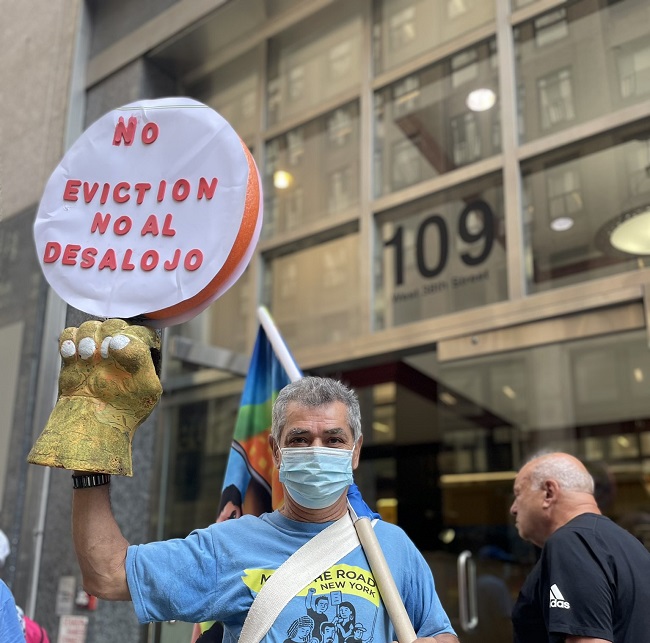After an extraordinary session called by Governor Kathy Hochul, New York State extends a moratorium on evictions until January 15, 2022, which will allow tenants to make new applications and resolve pending applications with the aim that thousands of families can remain in their homes while surviving the ravages caused by the COVID-19 pandemic and the highly contagious Delta variant is defeated.
Definitely, Governor Kathy Hochul is ushering in a new “era and consensus” that her predecessor failed to lead on the issue of housing and evictions.
He has reaffirmed one of his main priorities announced in his first official speech, by asking state legislators to meet in “an extraordinary session” to extend the moratorium on evictions that was scheduled to end on Tuesday, August 31, 2021.
Hochul’s “new and collaborative” approach is seen in not repeating last year’s mistakes with COVID-19. Therefore, establishing new proactive measures that keep tenants in their homes is the best way to prevent that from happening.
In a late-night briefing from Albany, he explained that he had previously had meetings with Assembly Leader Carl Heastie, as well as State Senate Majority Leader Andrea Stewart-Cousins, to ensure he addressed the housing crisis facing New York State.
“Under my supervision, we are not going to exacerbate what is already a crisis in terms of the homeless problem. We will not allow people who, through no fault of their own lost income, cannot pay and are facing eviction, ”Hochul said in his presentation.
From the State Capitol, he assured that they did not abandon the neighbors who face the greatest needs, especially because under the administration of former Governor Andrew Cuomo, the responsibility of delivering that money that the United States Congress assigned to the state of New York was not fulfilled. early summer.

About the judgment of the United States Court
On August 12, the Supreme Court of the United States blocked the moratorium on evictions in the state of New York, a measure that had been established in response to high levels of unemployment and lack of economic income, among other adversities, after becoming the epicenter of the global pandemic with hundreds of deaths and infections per day.
Ever since it became known that Hochul would assume command of the state after Cuomo’s resignation over allegations of sexual harassment, the governor felt the need to quickly address the Supreme Court decision and strengthen state eviction moratorium legislation.
The federal court ruling prohibited tenants from submitting a financial hardship form caused by the COVID-19 pandemic. Tipping the balance toward homeowners by arguing that the provision violated due process.
“This scheme violates the old teaching of the Supreme Court that normally ‘no man can be a judge in his own case,'” says part of the official document issued by the Supreme Court. A guideline that, according to the promoters of the law, exposes people on the streets, therefore, to infections and community transmission of the virus.
In contrast to this decision, Governor Hochul described the ruling as “ruthless” because the COVID-19 pandemic has not ended. Hence the approval of legislation to “take action.”
He has also said that “no New Yorker who has been financially hit or displaced by the pandemic should be evicted from their home.” Especially when the Delta variant lurks in hundreds of homes and thousands of families do not recover financially.

Governor Hochul’s First Steps to Help Tenants
Before August 31, the Hochul office had already announced a series of changes to help those who need to apply to the state’s Emergency Rental Assistance Program (ERAP), in order to attract more applications and accelerate payments.
After tenants with obvious needs presented several obstacles to applying on the website, the new state administration will invest an additional $ 1 million in marketing and outreach efforts to raise awareness of the rent relief program, available funds, and strong tenant eviction protections for those who request it.
“I want to get the money, and I want to get it now. No more excuses and delays ”, ordered Hochul in his first official speech for the rise to power of the most important state in the country.
The Office of Temporary Assistance and the Disabled, which administers the program, will analyze the application data, as well as 100 employees, will be reassigned to work directly with the owners and complete pending applications, which will allow expedited payments.
While the main objective is to help tenants, the extension of the moratorium on evictions until next year is expected to create legal challenges among landlords.
“We also know that owners are fighting and we must ensure that small businesses are also protected,” said the president.
The ERAP, which has been criticized for failing to fully disburse the $ 2.7 billion funds allocated to the state, seeks to establish that eligible tenants are protected from eviction for a full year while the application is reviewed.
Helping tenants of potential mass eviction in New York is about confronting a problem of fairness and justice that was exacerbated during the COVID-19 pandemic, with the vast majority of essential low-income workers being the most affected, with a disproportionate momentum in Latino and black communities.
Allowing people to be expelled from their homes is a moral farce, knowing that New York is sheltered under a supposedly progressive agenda, which has prioritized eliminating systemic racism and ensuring a fair economic recovery.
According to an analysis of data by the National Equity Atlas, there are six states where at least one in four low-income renters is behind on rent. New York has the highest proportion at 32 percent.
The research group indicated that after the federal court ruling, more than 830,000 households in New York State, most of them in New York City, are behind in rent, with an estimated total debt of more than of $ 3.2 billion.
The extension of the moratorium destined to end next year will initially serve to distribute the $ 2.7 billion in federal aid, after obstacles in the applications were presented, but with the advertising marketing initiatives, new applications are also expected to enter. of people who were not aware of this benefit.
The guidelines embodied in the program detail that it helps tenants regardless of immigration status, with up to 12 months of past-due rent, three months of prospective rental assistance, and 12 months of late utility payments.
The tenants do not receive that payment, but it goes directly to the owners who also have costs like mortgages or taxes on their property.
Applicant tenants will be notified of the amounts paid on their behalf. In the event that the owner is difficult to locate or does not provide the necessary information to complete the application, the funds will be held for up to 180 days to allow sufficient time to locate the owner and gather the required information, as well as to provide protection to the tenant.
The website for the Office of Temporary and Disabled Assistance, which administers the program, posted that as of August 23, 46,427 tenant applications have had their applications provisionally approved and have been reserved for rental assistance funds.
However, according to officials, the problems always arise in some cases with some discrepancies in the information between the requests of the tenant and the owner or, the need to reconcile the owner’s accounts, which is supposedly delaying the sending of payments.
It is expected that with the changes announced by Governor Hochul last week, they will work “proactively” to rectify these problems so that the direct payments already reserved can be disbursed.
On the state’s website, state officials reported that as of Aug. 23, approximately 176,113 households have submitted applications despite the slow process and errors. This would prevent at least those people applying for the state’s rent exemption, having the certainty of not being evicted.
State officials said more than $ 203 million has been distributed so far, or about 7% of the total money, state officials said. Which ranks New York second nationally for the most funds approved or paid to households, according to the National Low-Income Housing Coalition report, which tracks program implementation state-by-state.
Although in federal law, both tenants and landlords must complete the application before payments can be made, New York State allows the tenant side of the application to be approved for the tenant to be fully covered by the eviction protections offered by the program.
In these cases, the state holds the obligated funds for six months as efforts are made to identify and pay the owner. Tenants in this circumstance will receive a clear notice that they can use as an affirmative defense to avoid eviction for up to one year.
Gov. Hochul is clear that this legislation can create legal challenges for homeowners who have required authorities to focus on solving the problems of the Emergency Rental Assistance Program.
A group of homeowners from the Rent Stabilization Association, a trade association representing 25,000 building owners and managers in more than 1 million apartments in the five boroughs, threatened legal action against the state for extending the moratorium order until next month. anus.
They argued that the tenants were abusing the moratorium and not paying the rent when in some cases several of the beneficiaries did have the capacity to do so.
To request the rent deduction, you can apply online through this link, in the event that people do not have internet access, they can submit their request through a direct line: 1-844-691-7368.
If you cannot do this in person, local nonprofit housing organizations, legal services groups, and other community organizations can also apply on behalf of tenants.
Landlords and tenants must each complete their parts of the application before payments can be distributed.
There are also other measures that prevent evictions. At the state level, there is the Tenant Safe Harbor Law, which prevents the courts from evicting tenants who were unable to pay their rent during the pandemic due to financial difficulties.
“However, that law does not prevent eviction cases from being filed and it does not prevent evictions for reasons other than unpaid rent, and tenants must prove their claims in court.”



















































































